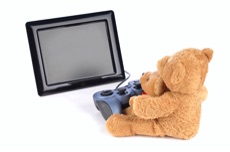Play video games with your child
Best way to monitor what your child plays
“There is little that gives children greater pleasure than when a grown-up lets himself down to their level, renounces his oppressive superiority and plays with them as an equal.” Sigmund Freud, 1908
It has been more than 50 years since the first video game (VG) was crafted. Now, it has become the most common 'toy' of our day. Statistics show that 97% of US kids play VGs. Be it online or offline, our children spend many hours in front of a screen, kicking a ball, racing a car, shooting a laser gun or building a house or a city. It is the catalyst on the playground where children connect socially with one another talking about these games and how they play them.
Best way to establish communication with a child is to do things together. After all, children feel happy and define happiness as “doing things together.” Therefore, it comes obvious that playing VGs with a child would be the easiest and quickest way to connect.
Despite this promise of VG play, only a few parents find the confidence and the time to pick up the game controller and join their children. In fact, a study at Harvard Medical School surveyed teenagers and showed that up to 6% reported playing VGs with a parent or a caregiver. Most parents today find themselves in the uncharted territory of VGs. After all, when they were kids, these toys were not prevalent at all. Others who played in the past have not done so in years and now struggle to get back on track.
So, how can you get used to playing VGs with your child? Here is a 5-step approach to tackle this issue:
First of all, remember: It is not how well you play, but how well you show your willingness to play with your child and whether you follow up on that promise. Do not let your novice status pose a hurdle in your way.
Once that hurdle is past, set aside some time and play with your child. Turn off the cell phone or pager and play with your child whatever game he or she enjoys. I sometimes write a 'prescription' saying, “Video game play 15-30 minutes with your child in person every night after dinner; side effects to be reviewed in the next meeting.”
Let your child teach you to play. Kids love the unusual experience turning the table by doing something better than the adults around them. If it feels cheesy to you, let it feel cheesy. Sooner or later you will notice the uneasy feeling gone and that you just enjoyed the last 10 minutes freely. Don't worry about losing or not offering enough of a challenge. This is one place you win by losing, but do not lose on purpose, either. It is usually not a good idea to 'let' an older child win. Kids are very perceptive and sooner or later they will sense. Once they conclude that you are faking it, all the credibility goes away and is very difficult to earn that back. But, if you are a beginner it is probably moot, you will lose.
Take some time at the end of the day to explore the game content and controls. This will give your child two solid messages: One, you are taking the game seriously; two, you are working hard to build and practice
As you get more comfortable in playing, ask to play with your child when his or her friends are over. Kids love it when they can show off to their friends that there are cool adults around them. Organize game days, etc. Once, my friend organized a “Halo Day”. We linked four gaming consoles to each other. Four players on each, adults and children together. I have not seen that many happy kids in one place, even in most birthday parties.
